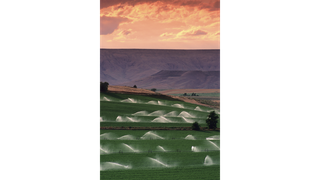An untapped water resource
With water scarcity increasing globally, greater efforts are being made to find ways of reusing municipal and industrial wastewater, such as for irrigation and industrial processes. In fact the technology is so advanced that it can even make wastewater drinkable.
DATE 2023-11-28 AUTHOR Nic TownsendAccording to the UN, almost one-fifth of the world’s population lives in areas experiencing water scarcity By 2025, it is estimated that two-thirds will experience water shortages. Yet at the same time, vast amounts of wastewater are generated daily, most of which is dumped into rivers and seas without adequate treatment, creating health and environmental hazards.
So increased focus is being put on water reclamation and efficient wastewater treatment, with ever-stricter regulations. “More and more people are realising that wastewater is a valuable resource,” says Mai Møllekær, Managing Director of Alfa Laval Ashbrook Simon-Hartley. “With the right solution, reusing wastewater is environmentally, socially and economically beneficial. Alfa Laval offers two filtration methods that help turn municipal and industrial wastewater into clean water.”
Membrane bioreactors (MBR) are an increasingly common solution for producing exceptionally clean effluent from biological wastewater treatment processes. They treat over 4 million cubic metres of wastewater every day – a figure that is expected to triple by 2018.
“Alfa Laval has developed a unique MBR technology, based on membrane filtration modules incorporating patented hollow sheet technology. Compared to other MBR solutions it offers improved safety, simplicity of operation, plus low operation and maintenance costs,” says Thomas Møller, Segment Manager for Water and Waste Treatment at Alfa Laval. “Our MBR solution proves its value every day at numerous installations worldwide. Several customers specifically chose this because of its exceptionally clean final effluent, which they can reuse.” AT
The wastewater treatment plant in Bassusary in southwest France, water treated using Alfa Laval MBR exceeds European standards, contains no bacteria, and is used to irrigate the local golf course. It also flows back into the town’s river, which is the main source of drinking water. Another French city reuses treated wastewater for its public toilets.
Alfa Laval MBR technology also treats wastewater in the textile, detergent, starch, and food and beverage industries, among others. At the San Vicente de la Sonsierra winery in Spain, it treats wastewater from 13 wineries. Groundwater is limited in the region, so the reclaimed water is used to irrigate the vines.
Other types of Alfa Laval membranes treat wastewater from dairies and vegetable protein production to reuse the water for cleaning process equipment and to recover protein.
Following its acquisition of Ashbrook Simon-Hartley, Alfa Laval also offers a tertiary filtration technology. The gravity-driven continuous Alfa Laval AS-H Iso-Disc cloth media polishing filter removes residual solids from wastewater to a high final effluent quality suitable for reuse. It is a compact, high capacity and cost-effective alternative to traditional sand filters.
The filter is used in wastewater treatment plants in a number of communities in the United States, where it exceeds state requirements. The Texan city of Meadows Place uses water reclaimed with Iso-Disc filtration to create a lake for recreation, and to irrigate local parks. The savings in water fees repay the investment cost in only a few years.
The filter is also used to polish industrial wastewater and remove accumulated inorganic solids in the food and beverage industry. It can also treat surface water for use in cooling towers or other process water
requirements.
Some wastewater treatment plants install Iso-Disc cloth media filters as a pre-treatment for downstream microfiltration or ultrafiltration membranes to polish the secondary effluent. This increases the filtration and economic efficiency of the membranes. In the city of Spring, Texas, a final reverse osmosis membrane treatment step has also been added. This enables the biologically treated wastewater to be reused as potable water, by conveying it to the city’s water treatment plant.
“With a variety of filtration technologies available, more communities and industrial producers are able to benefit from cheaper and cleaner water, as well as ease the pressure on the environment and the world’s depleting water supplies,” says Møllekær.
Talk to an expert

In Central Canada
Marc Hunt, Technical Sales Manager
+1 888 253 2226, Ext. 3421
Email Marc

Brian Kelly, Service and Parts
+1 888 253 2226, Ext. 6342
Email Brian
In Quebec
Pierre Gosselin, Technical Sales, Service +1 450 466 0555
+1 450 466 0555
Email Pierre
Alberta
Joshua Kowalchuk, Technical Sales, Service
Call: +1 587 643 5505
Email: Josh
Talk to Canadian Experts
+1 888 253 2226  Alfa Laval's Canadian Expert in
Alfa Laval's Canadian Expert in
Brewery Technology/Equipment, is Martin Ivanov, P.Eng. Ext. 343
Email Martin a question at Martin.Ivanov@alfalaval.com
British Columbia Derek Gluschenko, Technical Sales Service
Derek Gluschenko, Technical Sales Service
+1 604 734 2225
Email Derek

